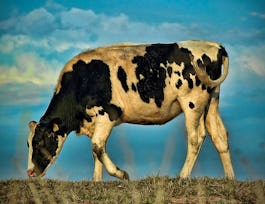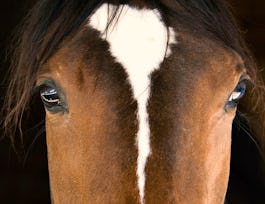This course explains the general principles of chicken behaviour and welfare, and the behavioural and physiological indicators that can be used to assess welfare in chickens kept in hobby flocks through to commercial farms. The focus is primarily on laying hens and meat chickens (broilers) although many of the principles are relevant to other types of poultry. The course is likely to be of interest to people who own chickens as pets or keep a small hobby flock, commercial egg and chicken meat producers, veterinarians and vet nurses.


Chicken Behaviour and Welfare
Taught in English
Some content may not be translated
36,717 already enrolled
(1,132 reviews)
Details to know

Add to your LinkedIn profile
6 quizzes
See how employees at top companies are mastering in-demand skills


Earn a career certificate
Add this credential to your LinkedIn profile, resume, or CV
Share it on social media and in your performance review

There are 6 modules in this course
This brief module will tell you all the things you need to know to begin, including the syllabus of the course, who we are, how to engage with one another.
What's included
2 videos1 reading
Welcome to the first week of the Chicken Behaviour and Welfare Course. If you haven't seen it - watch the video which introduces you to the course: you can find it under "Getting Started; Welcome!" During this lesson, we will consider what makes a domestic animal, how behaviour develops in the chicken from before hatching and beyond, different types of learning and the senses - vision, hearing, taste, smell and touch.
What's included
13 videos5 readings1 quiz
During this week, we will consider some of the major behaviour patterns of chickens, such as maintenance behaviours of chickens, and social behaviours. Maintenance behaviours means feeding, drinking, and comfort activities. Comfort activities include preening, dustbathing, and perching (among others). Social behaviours include communication, dominance, aggression, and spacing. This week will be a combination of video lectures, in-video quizzes and an interview with a backyard producer.
What's included
12 videos4 readings1 quiz
Welcome back everyone! During this week, we will consider the reproduction process in chickens, from courtship to brooding and hatching of eggs. We will then look at some abnormal behaviours that you might see in chickens. This week will be a combination of video lectures, in-video quizzes, video clips from outside sources, and a downloadable poster on eggshell abnormality.
What's included
12 videos6 readings1 quiz
During this week, we will consider what we mean by "animal welfare", and how a set of criteria known as the Five Freedoms can help you assess it. Dr Dorothy McKeegan from the University of Glasgow will discuss what the ethical obligations are of meeting an animal's welfare needs, and we will explore some of the various welfare standards that exist. Finally, we will look at welfare indicators, and Dr Barry Thorp from St David's Veterinary Team will discuss with Vicky what signs to look for in chicken flocks to make a welfare assessment. This week's Learning Outcomes: •Define 'welfare' and the Five Freedoms •What drives our ethical choices, including cost-benefit analysis •Describe some welfare standards available worldwide and how they differ •Explain ways to assess welfare, using behavioural and physiological indices
What's included
5 videos3 readings2 quizzes
This is the last week of the Chicken Behaviour and Welfare course, you are almost at the finish line... During this week, we will consider the welfare of layer hens and broiler (meat) chickens, from hatch to slaughter, particularly in common commercial systems. This week's Learning Outcomes: •Compare the most common housing systems used in Europe for laying hens •Compare the most common housing systems used in Europe for broiler chickens •Discuss the pros and cons of free range housing •Describe methods of emergency killing •Discuss different transport requirements, depending on the scale •Describe some of the common methods of slaughtering poultry.
What's included
10 videos3 readings1 quiz
Instructor

Offered by
Recommended if you're interested in Animal Health

University of Colorado Boulder

University of Illinois at Urbana-Champaign

University of California, Davis

University of Amsterdam
Why people choose Coursera for their career




Learner reviews
Showing 3 of 1132
1,132 reviews
- 5 stars
80.88%
- 4 stars
16.21%
- 3 stars
2.20%
- 2 stars
0.35%
- 1 star
0.35%
New to Animal Health? Start here.

Open new doors with Coursera Plus
Unlimited access to 7,000+ world-class courses, hands-on projects, and job-ready certificate programs - all included in your subscription
Advance your career with an online degree
Earn a degree from world-class universities - 100% online
Join over 3,400 global companies that choose Coursera for Business
Upskill your employees to excel in the digital economy
Frequently asked questions
Access to lectures and assignments depends on your type of enrollment. If you take a course in audit mode, you will be able to see most course materials for free. To access graded assignments and to earn a Certificate, you will need to purchase the Certificate experience, during or after your audit. If you don't see the audit option:
The course may not offer an audit option. You can try a Free Trial instead, or apply for Financial Aid.
The course may offer 'Full Course, No Certificate' instead. This option lets you see all course materials, submit required assessments, and get a final grade. This also means that you will not be able to purchase a Certificate experience.
When you purchase a Certificate you get access to all course materials, including graded assignments. Upon completing the course, your electronic Certificate will be added to your Accomplishments page - from there, you can print your Certificate or add it to your LinkedIn profile. If you only want to read and view the course content, you can audit the course for free.
You will be eligible for a full refund until two weeks after your payment date, or (for courses that have just launched) until two weeks after the first session of the course begins, whichever is later. You cannot receive a refund once you’ve earned a Course Certificate, even if you complete the course within the two-week refund period. See our full refund policy.


